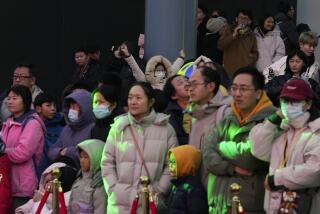Anger, Resentment Dampen China’s New Year : Beijing: Firecrackers and feasts bring in the Year of the Horse. But economic and political troubles make the mood more somber than usual.
- Share via
BEIJING — China’s 1.1 billion people said goodby Friday to a year of turmoil, repression, economic restraint and increasing street crime.
For many, the transition from the Year of the Snake to the Year of the Horse, which begins today, was the bluest New Year in more than a decade.
A taxi driver summed up the situation for himself and his colleagues by recalling an incident that occurred last week. Another driver had been robbed and stabbed to death near a luxury hotel in the northeast section of Beijing.
“It was a brutal murder,” the driver said.
The incident seemed to reflect the poverty and anger that has taken hold in the city, and it frightened many taxi drivers off the streets at night, worsening their poverty.
Across town, at the railway station, a young businessman who recently lost his job said he had had to borrow 24 yuan (about $5) in order to make his annual New Year’s trip home.
It was not just that he had lost his job, he said; his wallet had been stolen a few days earlier.
A clerk at the bustling Dongdan Food Market complained, “This New Year’s is just a lot poorer than last year’s.”
Not only do most Chinese have less than they had a year ago, they expect even less in the year ahead.
Less on the Table
With shopkeepers and businessmen, workers and managers, drivers and bureaucrats, the refrain is the same: Things are not as good as they were, and they’re getting worse.
To be sure, families all across China sat down to holiday feasts Friday, but there was a bit less on the table.
Firecrackers were heard everywhere--a Chinese tradition to ward off evil in the coming year--but the government acknowledged that fireworks sales were down by 25% from last year.
Trains were crowded with holiday travelers, but officials said there were not as many as in previous years because many people, out of work, had gone home months before.
In the past year of economic austerity aimed at cooling an economy overheated by a decade of reform and growth, the wages of millions of Chinese workers were cut. Production was suspended at thousands of factories. Unemployment in the cities doubled, and the official rate of inflation was nearly 20%.
Last month China devalued its currency by 21%, cutting deeply into the people’s buying power. Rumor has it that another devaluation is likely over the weekend.
The leadership has authorized billions of dollars in loans to maintain the suspended factories and pay the workers’ wages, but workers in many cities, reeling from pay cuts, have applied for permission to demonstrate. Unlike the protesters who provoked the government’s crackdown in Tian An Men Square last June, these people simply want to demonstrate for food, not democracy.
For the New Year, the pay cuts mean a smaller holiday bonus, which workers count on to finance the traditional feast. For some, it means no bonus at all.
Fewer Tourists
Taxi drivers are among the hardest hit. Tourism is down, and most Chinese take buses or ride bicycles, so most of the tourist companies that own taxis could not afford to pay a bonus.
“I guess we’re just going to have to get by on this level of income for a while,” one driver said.
The driver who mentioned the killing said: “We taxi drivers now have an added burden. All crimes against taxi drivers are for money, but we need money too.”
Perhaps sensing the sag in morale, Communist Party leaders have been barnstorming the country this week, urging continued hard work and party loyalty.
The state-run New China News Agency reported Friday that Jiang Zemin, the party general secretary, had returned from a six-day tour of factories and coal mines to make a surprise visit to a Beijing food market.
Jiang, accompanied by Mayor Chen Xitong, offered New Year’s greetings to clerks and shoppers and sought to assure everyone that food supplies are adequate.
Premier Li Peng, architect of the economic retrenchment plan, toured Nanjing and Wuxi, where the austerity program has hit many small factories.
Li delivered a simple New Year’s message: “So long as the leadership and the broad masses of the Chinese people unite as one, heighten their morale and work hard, all the difficulties can be surmounted.”
Nick Driver, research assistant in The Times’ Beijing bureau, contributed to this story.
More to Read
Sign up for Essential California
The most important California stories and recommendations in your inbox every morning.
You may occasionally receive promotional content from the Los Angeles Times.













